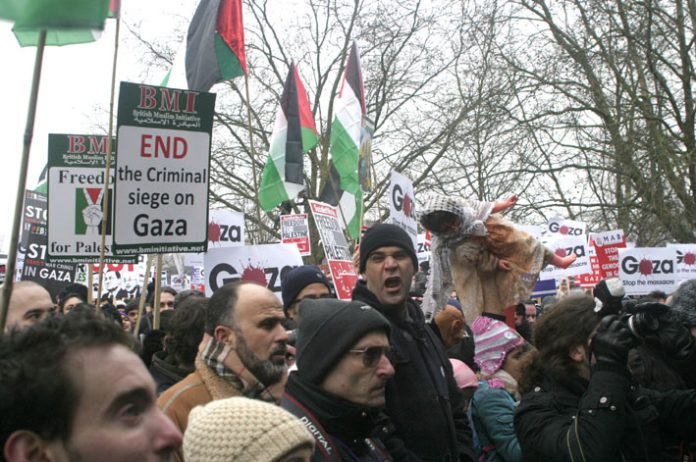DIVISIONS among the Israeli political leaders have emerged over the way to handle the offensive on Gaza.
Israeli Defence Minister Ehud Barak is promoting a week-long ‘humanitarian cease-fire’ in the Gaza Strip.
In contrast, Prime Minister Ehud Olmert, who lost the Second Lebanon war and has nothing more to lose, believes the military offensive has not yet achieved its goals.
Olmert is delaying a meeting with senior ministers in an effort to allow the military offensive in Gaza to continue.
On Tuesday, Olmert did not meet with Barak and Foreign Minister Tzipi Livni, and was against convening Wednesday’s political-security cabinet to discuss whether the operations should go on.
The head of the political-security bureau at the Israeli Defence Ministry, Amos Gilad, postponed a visit to Cairo for talks on a cease-fire on Monday, leaving open whether or not he would depart for Egypt later on.
Israeli media, quoting political sources, explained that even though Olmert holds a minority view in the troika, he holds the power because he decides when cabinet meetings will be held, and sets the agenda.
The troika is a monitoring and coordinating body, and lacks the authority to broaden or end Israeli army offensive. This can be done only by a cabinet vote.
Barak believes ‘Operation Cast Lead’ has achieved its main objectives, first and foremost bolstering Israel’s deterrent power. He does not believe continuing the offensive will bring further gains, but rather only operational complications and casualties.
On this point, Barak accepts the view of GOC Southern Command Major General Yoav Galant that expanding the offensive and occupying Gaza would require a lengthy deployment – possibly up to a year.
Barak is proposing the occupation army ceases its fire, holds its positions and keeps the reservists under arms, and then negotiates with Egypt and the United States on an arrangement that would include preventing arms smuggling into the Strip.
The Israeli defence minister is concerned that when US President-elect Barack Obama takes office next Tuesday, he will demand that Israel immediately cease the offensive.
Livni, for her part, insists Israel must end the offensive without an agreement, after ‘achieving deterrence’ against Hamas. She also believes the mission cannot obtain any more major gains.
Fearing another failure like the one during the Second Lebanon War, and after a day of discussions on the Gaza offensive at the Israeli Prime Minister’s Office, Ehud Olmert said, ‘We don’t want to see another Resolution 1701 like we did in Lebanon.
‘We don’t want to find ourselves tomorrow, in two days, or in five or 10 years facing a terror organisation armed with missiles that cover the whole of Israel. A unilateral withdrawal on our part at this time won’t guarantee that this won’t happen.’
Thus Olmert who has nothing more to lose after he has already been defeated in Lebanon by the resistance, insists on resuming the Israeli offensive in the Gaza Strip and killing more innocent Palestinians there.
Israeli occupation troops continued their crimes on Wednesday in Gaza, where over 1,000 Palestinians have now been killed in the ongoing aggression since December 27.
Palestinian Medic reports said that over nine Palestinians were killed in Beit Lahiya and Jabaliya, Northern Gaza.
At least three Palestinians were killed across the Strip overnight as Israel pounded the territory with more than 60 air and naval strikes and ground occupation troops clashed with resistance fighters in the open areas of the Strip.
Three occupation officers and three soldiers were injured in the fierce battles. The incident took place during an occupation paratroopers’ patrol in the northern Strip.
The Israeli force arrived at a building and took small arms fire from the resistance, in addition, several grenades were hurled at the soldiers.
Meanwhile, Israeli warplanes blasted Gaza’s southern border with Egypt with some three dozen bombing raids, sending panicked residents fleeing, witnesses said.
Since Israel unleashed ‘Operation Cast Lead’, at least 1001 Palestinians have been killed, including 300 children, and more than 4,500 people wounded, according to Gaza medics.
Palestinian sources said that rescue forces have so far been unable to coordinate the evacuation of casualties as the Israeli occupation army keeps shelling on them hindering any assistance.
The Israeli offensive has sparked withering criticism and protests and concern about a humanitarian crisis breaking out in the densely populated territory where half of the population is under 18 years of age.
Israeli Defence Minister Ehud Barak’s statements regarding the approaching end of the Israeli offensive on Gaza have earned him harsh criticism from top Israeli officials, who have said that Hamas interprets such statements as Israel trying to find a way out of the fighting.
‘Leaking details of ministers’ private initiatives is irresponsible and regrettable,’ said a state official.
Other top Israeli sources said that such private initiatives, which are not sanctioned by the limited cabinet – namely Prime Minister Ehud Olmert, Defence Minister Ehud Barak and Foreign Minister Tzipi Livni – are detrimental to the future success of Operation Cast Lead.
‘Such media reports are infuriating,’ a top source told Ynet.
‘Senior ministers making such public statements serve only to encourage Hamas and boost its activists, and that affects a million Israelis in the south and thousands of IDF soldiers deployed in the Gaza Strip.
‘Any and all ideas pertaining to operational activities should be discussed behind closed doors, not through media headlines.’
Total ambiguity as to Israel’s future moves must be maintained, added the source. ‘It is the only way to fully achieve our operational objectives.’
Olmert, said another source, seems to subscribe to a similar sentiment.
‘We can only regret that certain political interests have resulted in certain notions [regarding the offensive] being discussed in the media, instead of in the small forums, where they belong.’
Barak’s outspoken support for the Egyptian initiative for a ceasefire, claimed the sources, have harmed Israel’s stance in any possible negotiation, since intelligence reports presented to the Israeli government indicated that Hamas sees them as a sign of weakness.
